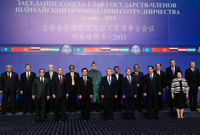Despite expectations, the 10th Meeting of the Prime Ministers of the Shanghai Cooperation Organization (SCO) held in St. Petersburg, Russia, on Nov. 7, 2011, did not announce the addition of any new full members or full observers. The SCO governments have repeatedly claimed that they need more time to establish the rules and procedures to govern new members. In reality, the existing members have proven unable to overcome their differences regarding which countries should receive membership or observer status. Indeed, some appear to fear that membership enlargement would weaken rather than strengthen the organization.
Clearly the SCO remains stuck in an expansion dilemma. For the sixth year in a row, the organization did not admit any new observers, and the current roster of full members continues to be limited to those that joined the SCO at its founding in 2001: China, Russia, Kazakhstan, Kyrgyzstan, Tajikistan and Uzbekistan. Four observer countries -- India, Iran, Mongolia and Pakistan -- were admitted by 2005. Since then, however, the organization has resorted to creating new categories of external association, producing a confusing mixture of full members, formal observers, “guests” of the rotating host government of the annual SCO leadership summit and, most recently, “dialogue partners.”
The SCO designated its first formal observer, Mongolia, in June 2004, after having finalized regulations on observer status earlier that year. India, Iran and Pakistan became observers at the 2005 summit. Other countries have since expressed interest in becoming formal observers, but the SCO has not yet moved forward in accepting new participants. In the meantime, Iran, Pakistan and India have applied to become full members. Despite several years of discussions and analysis, the SCO governments claim that they have been unable to define the legal basis for adding members. In order to address this issue, the governments established a group of experts to study expansion and draft the necessary legal procedures for admission.

